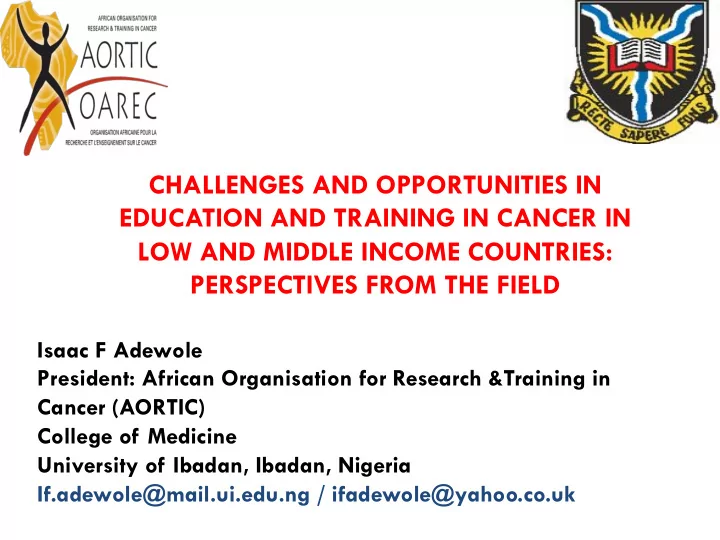

CHALLENGES AND OPPORTUNITIES IN EDUCATION AND TRAINING IN CANCER IN LOW AND MIDDLE INCOME COUNTRIES: PERSPECTIVES FROM THE FIELD Isaac F Adewole President: African Organisation for Research &Training in Cancer (AORTIC) College of Medicine University of Ibadan, Ibadan, Nigeria If.adewole@mail.ui.edu.ng / ifadewole@yahoo.co.uk
OUTLINE ! Introduction ! Peculiarities of the low- and middle-income countries ! Education and Training ! Identified Opportunities ! Identified Challenges ! Solution: My thoughts ! Conclusion
Introduction ! Despite steady decreases in the cancer burden in industrialized countries, its rapid increase in the developing world means that the number of cancer cases and deaths will likely more than double worldwide over the next two decades. ! Already a leading cause of death around the globe, cancer—grouped as all types of the disease— was associated with 7.4 million deaths in 2004 and is projected to lead to 12 million deaths in 2030. ! Notably, more than 70% of all cancer deaths occur in low- and middle-income countries Dejana Braithwaite, Karen J. Wernli, Hoda Anton-Culver, et al. Opportunities for Cancer Epidemiology and Control in Low- and Middle-Income Countries. Cancer Epidemiol Biomarkers Prev 2010;19:1665-1667.
Cancer Control Research Framework Intervention Research Surveillance Knowledge Kno ledge Fundamental Research Synt nthes hesis is Research Application and Program Delivery Reducing the cancer burden Adopted from the 1994 Advisory Committee on Cancer Control, National Cancer Institute of Canada.
AFRICAN SITUATION REPORT “The harvest is plentiful, but the workers are few” NIV Rainbow Study Bible Matt 9v37
Peculiarities of the low- and middle-income countries ! Demographic profiles NCDs on the rise ! Under-served area Infrastructural challenges ! Political instability ! Health financing challenges
Resource constraints (Int. $s) Gross National Total health T Govt. health health People per Income per ex expenditure expenditure iture nurse, person, per per person, per person, son, 2002 2005 2003 2003 Tanzania 730 29 16 2,703 Nigeria 1,040 51 13 588 Rwanda 1,320 32 14 2,381 Uganda 1,500 75 23 1,639 Ghana 2,370 98 31 1,086 Botswana 10,250 375 238 377 China 6,600 278 101 952 UK 32,690 2,389 2,047 83 USA 41,950 5,711 2,548 107
Poor health care financing: Africa example
Cancer Education & Training ! Crucial and sometimes rate-limiting step in ensuring optimal cancer care delivery systems ! Could be done on- and off-site thereby affording maximal opportunity in acquiring appropriate skills and also measuring the impact ! Reducing the morbidity and mortality caused by cancer is a global priority. Benjamin O Anderson et al. Optimisation of breast cancer management in low- resource and middle-resource countries. Lancet Oncol 2011; 12: 387–98. Richard Sullivan et al. Delivering affordable cancer care in high-income countries. Lancet Oncol 2011; 12: 933–80
Rationale for Cancer Education & Training ! Increase number of patients ! Increase in cost of cancer care ! Inadequate number of skilled personnel ! Novel intervention often focused on high resource settings ! Treatment options in low-resource settings are often limited and disorganised because of advanced stages at presentation ! Limitations in available specialised cancer care centres
Identified Challenges ! Expertise in care/Mentoring ! Poor understanding of community needs ! Limited resources to offer optimal training for those being trained within ! Difficulty in re-integrating to the system for those who trained abroad ! Limitations in conducting research
Experts in Cancer Care ! Success of any programme depends on well-trained personnel/workforce ! Number of specialist to teach and train are limited. ! Over-utilization of the available cancer care providers AJ Price et al. Cancer Care Challenges in Developing Countries. Cancer 2012;118:3627-3635.
Understanding the community needs ! Need for trainers to understand the peculiar needs of the community Appropriate communication skills ! Poor response to screening ! Diverse socio-cultural perspectives of cancer diagnosis and management Role of traditional healers AJ Price et al. Cancer Care Challenges in Developing Countries. Cancer 2012;118:3627-3635.
Resources for training ! Limited resources to offer optimal training Personnel Facilities Acquisition of necessary equipment
Challenges of Re-integration ! Challenges of the work environment in terms of available facilities ! Resistance from those not willing to change from the old system Poor sub-specialization programmes
Limitations in Research ! Research investment to improve or maintain level of care while controlling costs requires a multifaceted approach that supports the following: Basic, translational, and clinical research focused on development of new ( or more effective) interventions Comparative-effectiveness and health-services research aimed at defining the most efficient way to deliver care and improve delivery of evidence-based care Prevention and life-style modification research that might reduce cancer risk or risk of recurrence. Richard Sullivan et al. Delivering affordable cancer care in high-income countries. Lancet Oncol 2011; 12: 933–80
Identified Opportunities ! Structured facilities ! Available trainable-personnel ! Training could be done within the country when there is appropriate capacity building measures ! Large pool of patients for adequate clinical based training ! Renewed interest in sub-specialization thereby increasing the opportunity for multidisciplinary approach to care
Solution: My thoughts ! Training within the country with international experts as mentors would enable standardization of facilities for provision of cancer care ! Increase access to international collaborations ! Improvement in the use of the Telemedicine technology ! Training exchanges between countries of similar resources.
Solution: My thoughts ! Network of cancer care providers within a locality with rapid dissemination of appropriate evidence- based information. ! Regional cooperation imperative ! Countries with low or medium levels of resources should incorporate necessary budgetary allocations for training and provision of necessary facilities/ equipment.
Conclusion ! Cancer Education and Training deserves attention of all ! Translation Cancer Research is imperative To integrate scientific disciplines Pool available resources Establish adequate facilities to coordinate, oversee and facilitate high-quality research efforts
“We have to work together to ensure access to a motivated, skilled, and supported health worker by every person in every village everywhere.” LEE Jong-wook High-Level Forum, Paris, November,2005
Recommend
More recommend